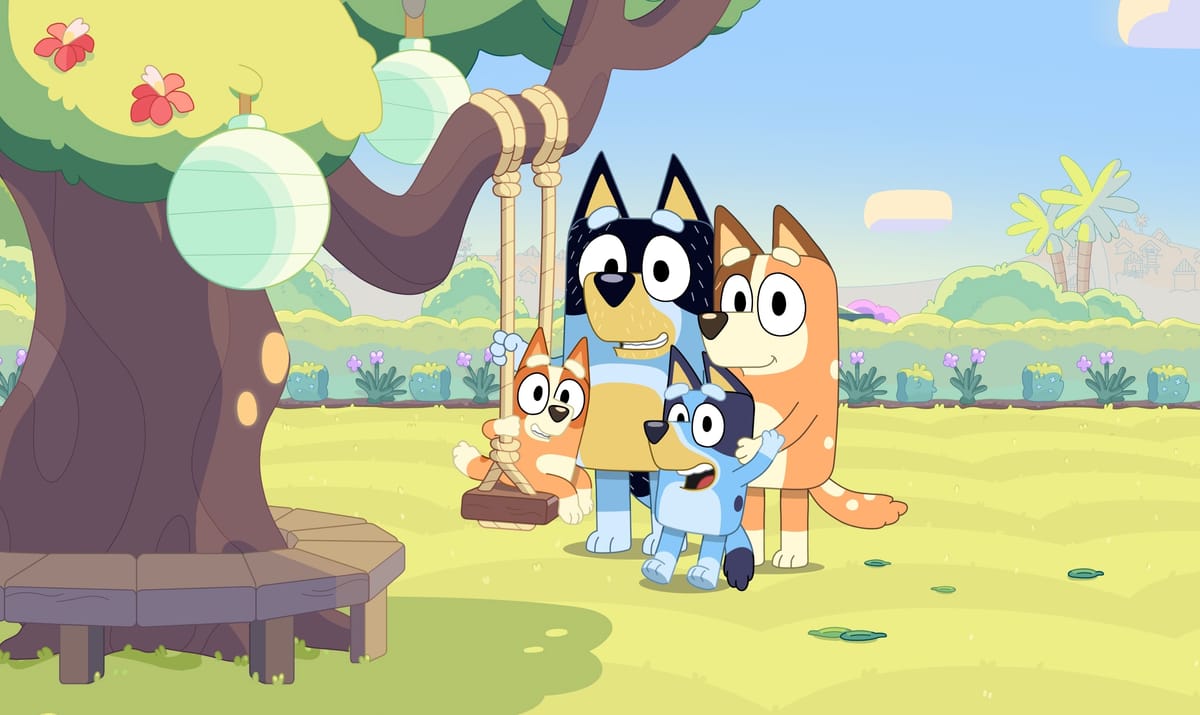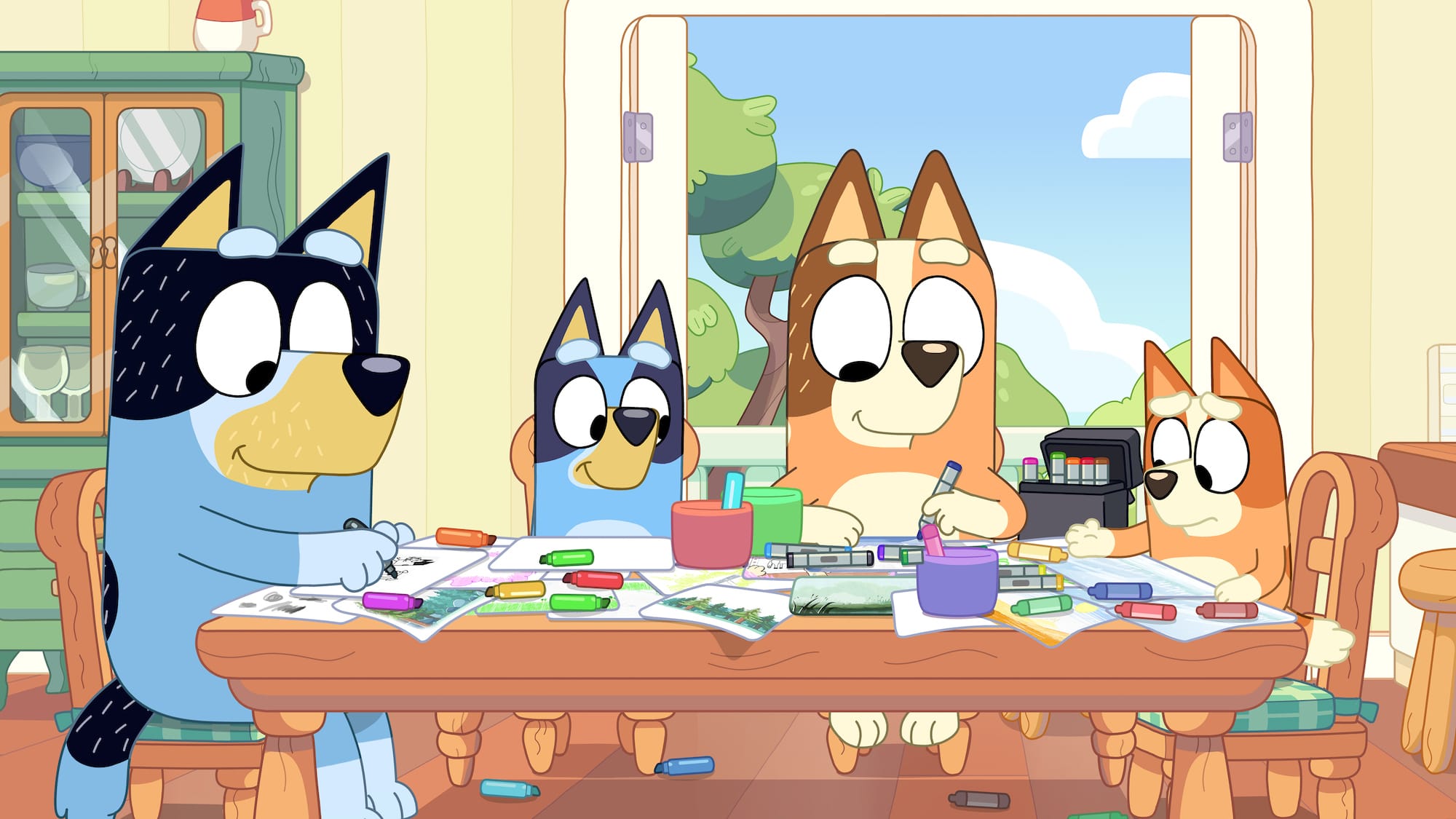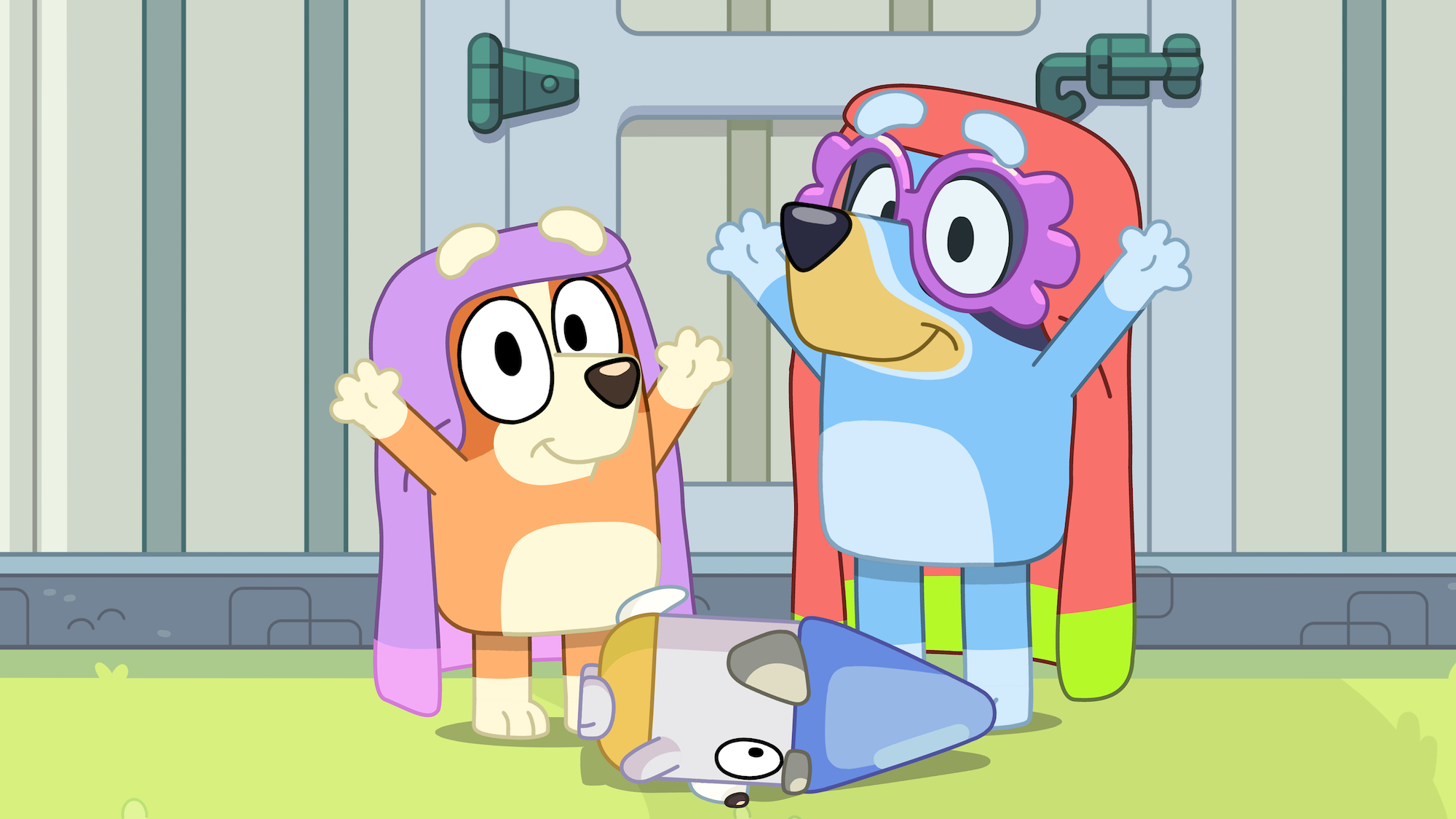"Bluey" Gives Us a Lesson on the Necessity of the Ending

I love a good kicker. As an editor and a writer, ending a story on the best possible note — high, low, a great quote, something pithy — is just as important as a pull-'em-in lede.
If we look around, though, it's clear we don't know how to end stories. Worse, we don't want our stories to end.
We live in the comic book age. Not an earthshaking observation. But Hollywood's addiction to superheroes is both the source and a symptom of the larger change. Studios' basic storytelling DNA has been infected by comics publishers' approach to narrative.
Not so long ago, you could buy a standalone issue of your favorite superhero adventure and be guaranteed a complete story. There was a beginning, middle, and end. The occasional multi-issue arc or publisher-wide event would pop up, but generally, month to month, each new issue could easily be enjoyed on its own while enriching the broader mythos for anyone paying attention.
But then publishers figured out there was more money to be made on endless cycles of interconnected events, relaunches, and Proustian story arcs that run dozens of issues (or longer). The single issue mattered only as an atomic unit in a larger body. Collectors will buy everything, but the casual reader is utterly lost if they strayed into, say, a Batman story because they thought the issue’s cover was cool. And even when the arc or whatever wrapped up, it didn’t really end so much as tee up the next event or epic multi-year storyline. The traditional way of telling a story — beginning, middle, end — was replaced by a permanent middle.
The scheme jumped from comics to movies with the Marvel Cinematic Universe, whose success allowed it to materialize everywhere else. Adaptations of bestselling books became multi-episode “limited series” — a fig leaf to allow celebrities to avoid saying they were doing television — that begat subsequent "limited series," forming a broader universe around the source material. Productions that otherwise would have existed as actual miniseries became proofs-of-concept for larger, increasingly baroque narratives. (Looking at you, Westworld.) Audiences were trained to anticipate stingers during and after credits that set up future installments of whatever they were watching. And they expect endless product from their favorite IP. Star Wars? Spider-Man? Transformers? Ghostbusters? Harry Potter? Dune? None of it will ever end. Ever.
It's a kind of engineered, super-refined nostalgia that is so pervasive, so accepted, that whenever something does end we go through withdrawal. The Big Bang Theory prequel Young Sheldon recently wrapped up after seven seasons on CBS. Ahead of its finale, the New York Times ran the headline, “'Young Sheldon' is one of TV’s most popular shows. So why did it just end?” Maybe because there was no more story to tell? How many seasons of Young Sheldon can one endure before it’s Old Sheldon?

A similar thing happened with Bluey when the final episodes of its third season dropped on Disney+ in April. Episode 49, "The Sign," was a supersized 30 minutes — each episode is typically eight minutes — and had all the vibes of a series finale, with Bluey’s parents selling their house and preparing to leave their friends and lives for a new city.
“The Sign" is, frankly, brilliant. Not only does it capture the unique kids-will-love-this-and-parents-will-feel-all-the-feels alchemy of the show, but the storytelling is tight and smooth, it‘s eminently watchable (my daughter has seen it at least a half dozen times, and I get sucked in every time it's on), and it calls back to countless moments and experiences from the previous 150-ish episodes. Creator Joe Brumm has said the show is taking a break and that “The Sign” isn’t the end. Indeed, a traditionally-lengthed episode dropped a week or so later that serves as a kind of epilogue. But “The Sign” feels like the end — of something, if not the series. It wraps up nearly every narrative thread Bluey introduced. It feels valedictory and satisfying and rewarding for kids (and parents) who have stuck with the show. And it climaxes with Bluey's uncle Rad marrying her (fairy) godmother, Frisky, itself a callback to a couple Season 2 episodes.
If Bluey is over, it ended beautifully. And it earned its conclusion — or break, whichever it is. But some adults cannot accept that this kids show is possibly over. From hyperventilating social media comments to critical essays, it’s inconceivable to far too many people that this (maybe) is it. “I agree to accept the things I cannot change. But can this please not be the end?” Sophie Gilbert wrote for The Atlantic. “Bluey has given us the gift of more than 150 episodes, enough of them to return to over and over, maybe even more than we deserve. And yet, every new installment is evidence that the show is becoming ever more creative, more empathetic, more necessary.”
I agree with the sentiment. My tolerance for 21st century kids television is basically nonexistant. Too much of it is sensory-overload anxiety attacks with little educational — or, frankly, entertainment — value. But I love Bluey. Love it. It meets kids at their level. It's never patronizing or condescending and celebrates the unique way kids see the world. Bluey is calm, engaging, smart, and empowering. It fires my daughter's imagination and encourages her to own her creativity, silliness, feelings, all of it. And when I watch it with her, I find a show that recognizes adults are important parts of their kids' lives (not dummies to embarrass), that gives parents permission to be goofballs, and that understands the challenges of parenthood, adulthood, and the core conflict between providing for your children's health, safety, and development and ensuring you're taking care of yourself, too. (There are episodes in Season 3, like "Stickbird" and "Cricket," that resonant on some deep, primal level.) Bluey is by no means perfect, but it's more often than not terrific. It's some kind of miracle in this era of CoColemon and Paw Patrol vapidity, and I'd be bummed if it's reached its conclusion. (There are some "mini-episodes" coming soon, so this is very much a live question.)
But I’ve also been around long enough to know that the pace of creativity and empathy on display in Bluey is unsustainable. I’d rather see the show go out at its peak than overstay its welcome. And what toll has building this engine of creativity, imagination, and empathy — which, thanks to Disney, has also become a marketing juggernaut — taken on its creator and his collaborators? If we're going to embrace empathy, let's practice what we preach.

Clearly, ending things is hard. Putting a period at the end of a sentence at the end of a paragraph at the end of an article or screenplay or book is scary. For producers, certainly, because now the cash spigot is off. But for writers and filmmakers and artists and athletes — and people — too. Saying “The End” means something is over. And what comes next? Suddenly there’s a void of uncertainty where there was once reliable routine. But there’s also opportunity to build something new, better, more mature, more challenging.
Watching (and rewatching — and rerewatching) “The Sign” has given me a renewed appreciation of the ending. It’s so rare today that to come upon one is like discovering an oasis in the desert. It’s a jolt out of the stagnant middle that everything seems stuck in. It’s cathartic, in its way.
And like endings, catharsis is in short supply. America is not a nation that grieves well. (See: the pandemic.) Maybe it's because we have (had?) an optimism that our story is just beginning, the arrogance to insist on being the authors of our own narrative. But endings challenge those beliefs and lead to a grief we’d rather repress. The loss of a loved one or a family pet or a job or a show means acknowledging something is over and we had no say over it. How dare you.
But stories need endings. Otherwise, they're not stories. The ending can be total — this book/movie/show is over — or liminal — this chapter, this phase is done. Either way, there needs to be a conclusion: to take stock, to allow for growth, to begin a new chapter, a new phase, a new story.
"The Sign" — and, in its own way, Larry David’s snarky conclusion to Curb Your Enthusiasm — is a masterclass in the importance and necessity of the ending. It shows us they can not only be done, they can be satisfying and celebratory.
After a couple decades of trying to outrun them, we should embrace the ending and all it can teach us. And after we have a little cry over whatever has ended, we can pick ourselves up, dust ourselves off, and keep going — to write, seek out, and embrace new stories.
And if that order of business doesn't ring any bells, you clearly need to watch more Bluey.


Comments ()